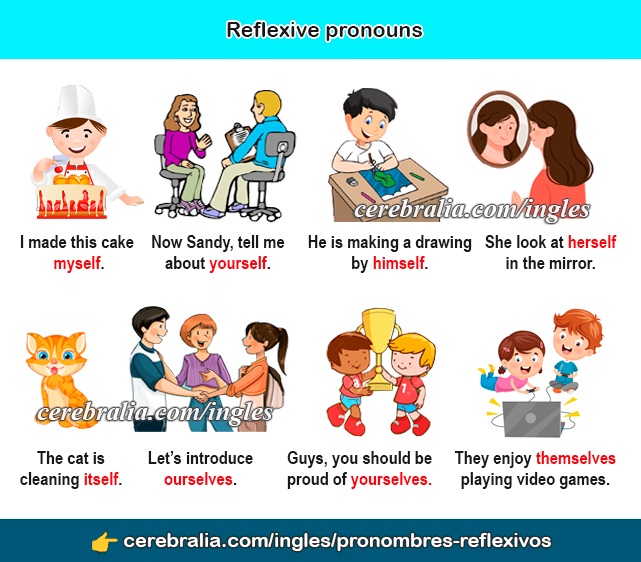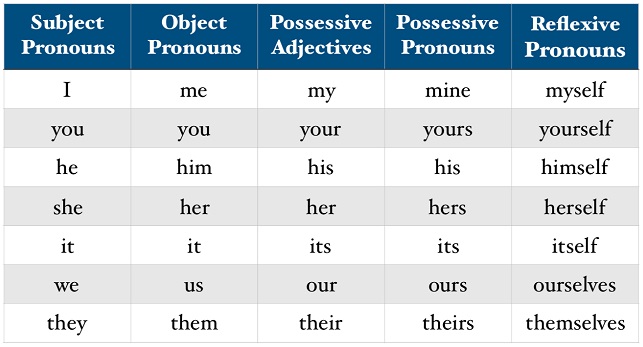Comparte en:
Reflexive pronouns
(Los pronombres reflexivos en inglés)
Los pronombres reflexivos se utilizan con los verbos transitivos cuando el complemento directo del verbo se refiere a la misma persona que el sujeto. Recordemos que los verbos transitivos son los que necesitan un complemento directo (denominado “direct object” en inglés) para transmitir una idea completa.
Los verbos transitivos que se suelen emplear con pronombres reflexivos son: enjoy (disfrutar), listen (escuchar), blame (culpar), cut (cortar), hurt (herir), help (ayudar), introduce (presentar), teach (enseñar), dry (secar), prepare (preparar), keep (mantener), hear (oír), look (mirar).

Ejemplos:
- I cut myself with a knife.
(Me corté con el cuchillo) - I talk to myself when I'm alone.
(Hablo conmigo misma cuando estoy sola) - I painted the house myself.
(Pinté la casa yo mismo) - Peter, you have to believe in yourself.
(Peter, tienes que creer en ti mismo) - Do you really knit your own socks yourself?
(¿Realmente tejes tus propios calcetines tú mismo?) - What a great party! Did you prepare everything yourself?
(¡Qué gran fiesta! ¿Lo preparaste todo tú mismo?) - He will kill himself with that motorbike.
(Él se matará con esa motocicleta) - He learned to speak chinese by himself.
(Él aprendió a hablar chino por sí mismo) - The chairman himself opened the meeting.
(El presidente mismo abrió la reunión) - She took a knife and defended herself.
(Ella tomó un cuchillo y se defendió) - She burned herself while cooking the pizza.
(Ella se quemó mientras estaba cocinando la pizza) - She considers herself a beautiful and kind person.
(Ella se considera una persona hermosa y amable) - My cat is scratching itself all the time.
(Mi gato se está rascando todo el tiempo) - The sheep threw itself into the water.
(La oveja se arrojó al agua) - The proposal itself surprised everybody in the family.
(La propuesta misma sorprendió a todos en la familia) - We drew ourselves on the wall.
(Nos dibujamos a nosotros mismos en el muro) - We put ourselves at great risk in that situation.
(Nos pusimos en gran riesgo en esa situación) - Paul, the new secretary is over there. Let's introduce ourselves.
(Paul, ahí está la nueva secretaria. Presentémosnos) - You guys should be proud of yourselves.
(Deberían estar orgullosas de ustedes mismos) - You all can consider yourselves lucky to be here.
(Todos ustedes pueden considerarse afortunados de estar aquí) - They found themselves in serious trouble.
(Ellos se encontraron en serios problemas) - They will only believe it when they see it themselves.
(Solo lo creerán cuando lo vean ellos mismos) - They themselves wrote the article for the newspaper.
(Ellos mismos escribieron el artículo para el periódico)
✅ También podemos servirnos de estos pronombres reflexivos cuando queremos indicar que alguien ha hecho algo sin ayuda. En este caso hay que añadir al pronombre la preposición «by». Cuando los pronombres reflexivos van antecedidos de la preposición BY, se traducen como «solo» o «sola». Ejemplos:
- I live here by myself.
(Vivo aquí solo) - She went on vacation by herself.
(Ella se fue de vacaciones sola) - He decided to finish the project by himself.
(Él decidió terminar el proyecto solo) - We painted the house by ourselves.
(Pintamos la casa nosotros solos)
✅ Ten en cuenta que no es necesario usar los pronombres reflexivos en oraciones que se refieren en acciones cotidianas que recaen sobre el sujeto que las hace. Ejemplos:
- I shower every morning. ✔
(Yo me baño todas las mañanas) - I shower myself every morning. ✖
(Yo me baño todas las mañanas) - Patty relaxes by doing yoga every evening. ✔
(Patty se relaja haciendo yoga por las tardes) - Patty relaxes herself by doing yoga every evening. ✖
(Patty se relaja a sí misma haciendo yoga por las tardes)
✅ Cuando queremos referirnos a dos personas que realizan una acción recíproca empleamos «each other». Ejemplos:
- Mary and Peter speak to each other every day.
(Mary y Peter se hablan todos los días) - They helped each other with the housework
(Se ayudaron mutuamente con las tareas de la casa) - They share their creative ideas with each other.
(Ellos siempre comparten entre ellos sus ideas creativas)
🥇 Aprende más sobre los tipos de pronombres en inglés:

✅ El Pronombre Sujeto y ejemplos de oraciones
✅ El Pronombre Objeto y ejemplos de oraciones
✅ El Adjetivo Posesivo y ejemplos de oraciones
✅ El Pronombre Posesivo y ejemplos de oraciones
✅ El Pronombre Demostrativo y ejemplos de oraciones

